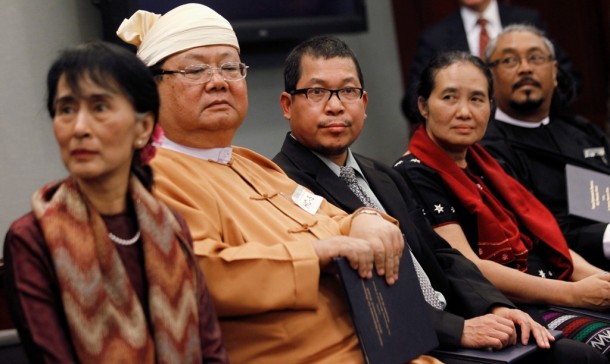RANGOON — A handful of senior leaders from one of Burma’s strongest ethnic political parties, the Shan Nationalities League for Democracy (SNLD), will not contest in the country’s upcoming general election, saying their abstentions will allow them to advance their political agenda outside the walls of Parliament.
Party chairman Khun Htun Oo, vice chairman Sai Saw Aung, secretary Sai Nyunt Lwin, joint-secretary Sai Leik and party coordinator Sai Agga are all opting out of the poll due Nov. 8, according to Sai Leik, who also serves as party spokesman.
“We need to have our people in Parliament, while we also need to politick outside Parliament, [for instance] if a political dialogue happens in 2016. Additionally, constitutional amendments in the Parliament are also unlikely to happen,” he told The Irrawaddy on Tuesday, while adding that the party was not abandoning the legislative arena.
“We cannot predict [changes] in the Parliament either, that’s why it’s impossible not to have people on the inside,” he said. “On the other hand, attempts at constitutional amendment should also be addressed through political dialogue of the leaders of armed groups, who are engaged in peace talks [with the government]. Mainly, [the SNLD wants] to balance the ratio of political activities inside and outside of Parliament.
“The results of the political dialogue could provide the basic principles to rewrite a new constitution. That’s why we have reserved some people to work outside parliamentary politics.”
Sai Leik said the party plans to contest 160 seats in five states and divisions, and has so far finalized its selection of almost 100 candidates, racing to meet an Aug. 8 deadline for candidate submissions set by Burma’s Union Election Commission (UEC).
“The party will compete wholly [for all constituencies] in Shan State,” Sai Leik said, as well as “four to five seats” in both Karenni and Kachin states, two Shan ethnic affairs minister posts in Sagaing and Mandalay divisions, and the Lower House constituencies of Mogok and Pyin Oo Lwin.
Meanwhile, a meeting of eight political parties known as the United Nationalities Alliance (UNA), of which the SNLD is a member, entered its second day on Tuesday. The alliance’s members have gathered in Rangoon to discuss which races each party plans to contest, in an effort to avoid fielding competing candidates in some constituencies.
Sai Leik said the National League for Democracy (NLD), not a UNA member, had failed to send representatives to the meeting despite being invited by the alliance.
Burma’s largest opposition party has not made a substantive commitment to work with ethnic political parties in the upcoming vote, saying only that it will not field candidates in races being contested by fellow former members of the now-defunct Committee Representing the People’s Parliament (CRPP).
The membership of the CRPP, likely to include at most only a handful of non-NLD contestants in the 2015 poll, had been comprised of winners of Burma’s 1990 election.
Former CRPP member Khun Htun Oo and his SNLD competed in the 1990 election, in which the chairman won a seat in a vote that was ultimately ignored by the former military regime.
The SNLD and NLD both boycotted Burma’s last general election in 2010, ceding political space in Shan State to the Shan Nationalities Democratic Party (SNDP), which picked up two seats in Upper House of the Union Parliament, 17 seats in the Lower House and 32 in the state legislature.

















